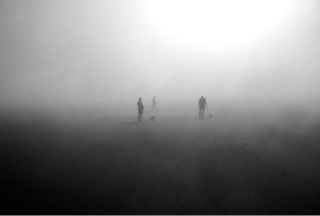When We Wonder Together
By Meck Groot, Joe Sullivan

In our experience, most Unitarian Universalist congregations are not culturally predisposed to using discernment as a way to determine direction, focus or action. Our congregations generally use “the democratic process” in which group decisions are made by majority vote. The vote is taken after one or more opinions have been debated with arguments for and arguments against. Arguments may be persuasive if well-reasoned, well-articulated and/or stated with passionate conviction. Once cases are made, a choice is offered to voters: Yes or No; option A or B (and occasionally C).
It’s no coincidence that the words decide and homicide share a common root: caedere meaning “to kill or cut down.”
Making choices in this way happens routinely in board, committee, and congregational meetings. It also happens in business meetings of the UUA. It is promoted in the 5th Principle: “The right of conscience and the use of the democratic process within our congregations and in society at large.”
Of course, decisions need to be made. There’s nothing wrong with making them using the democratic process. But that isn’t enough. In times calling for faithful risks to change or resist prevailing culture in the service of love and mission, democratic process can’t be the only way we find our way together.
Sometimes, we need deeper and wider wisdom than our minds can reasonably grasp but which our hearts call us to. Sometimes, we need to broaden our perspective by listening heart-to-heart to fellow congregants. Sometimes, love begs us not to marginalize anyone by turning them into the “minority opinion.” Sometimes, we need to re-remember and recommit to our mission and values. Sometimes we need to pause and wonder together.
In situations where no options seem clear, or stakes feel high and choices feel risky, group discernment is a way we can wonder together. Through group discernment, we can sort out what risks might be the faithful ones to take. In the Claiming Our Spiritual Leadership course we offer through UU Institute, the NER team claims, “For a risk to be faithful, its hoped-for outcome must advance your mission and vision. It must lead to more love, more grace, more justice. We take the risk because the mission and vision are so important that we are willing to lose money, lose members, lose momentum.” In the long run, our mission, vision and values make the risk worth taking.
There’s nothing easy about group discernment for any group, let alone Unitarian Universalists. In traditions with discernment practices, a key component is “listening to God or the Holy Spirit.” That works for some UUs. Others will have to translate that into their own experience. (We might suggest “listening for/to the transformative power of love.”) Group discernment also requires that we release attachment to particular outcomes. We don’t come with an agenda and we don’t push for one. We trust deeply that all others have also released their agendas and come wholly open. For most of us, that means doing some deep inner work. Group discernment takes willingness to be changed — a huge challenge for those of us programmed to seek control, yet also a fundamental purpose for a faith-based life seeking alignment with values and mission.
And it takes time. Open, spacious time that we usually think we don’t have. Yet, imagine how much ease and effortlessness may result when a trusting community is aligned, engaged purposefully together, intentional, willing to take losses for the sake of something greater, and collectively enlivened by a courage that wasn’t there before.
Imagine how much time and energy and grace that would free up! Just imagine.
____________________________________________________________________________________
If you would like to learn more about this practice, please review the materials generated for the March gatherings of Spiritual Leadership for Culture Change which can be found on this resources page.